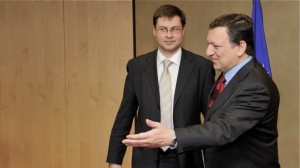
Latvian Prime Minister Valdis Dombrovskis meets with President of the European Commission José Manuel Barroso earlier this month to discuss the country's loan agreement. Photo by the Latvian State Chancellery.
RIGA — Latvia will receive the next €108 million tranche of the International Monetary Fund’s aid package to the country after an understanding between the two parties was reached in Riga on Monday.
Following the visit of a joint mission from the IMF and the European Commission, which visited the country from May 19 to June 7. Latvia’s previous government made the deal with the international lenders on a €7.5 billion bailout loan for the country in 2008. Very tough austerity measures were forced upon the country as part of the conditions for the loan.
The government had to agree to more cuts to the budget and consolidation to the tune of 395–440 million lats (€564-629 million) in order to reach the prescribed target of a budget deficit of 8.5 percent of the country’s gross domestic product.
“We have reached agreement at staff level on the third review of the Stand-By Arrangement. Subject to approval by IMF Management, and, subsequently, by the Executive Board, the fourth disbursement (about €108 million) would become available,” Mark Griffiths, IMF Mission Chief for Latvia said in a press release.
Latvia’s loan agreement requirements:
• Continue to target a 2010 fiscal deficit of no more than 8.5 percent of GDP
• Protect social safety net spending
• Increase appropriations for EU co-financed projects
• Reduce the 2011 fiscal deficit to no more than 6 percent of GDP, estimated at an additional €564-629 million
• Implement the restructuring plan for Parex Bank once it is approved by the EC
• Work closely with the EC to pursue reforms as specified in their Supplemental Memorandum of Understanding
“Policy implementation over the past year has helped restore confidence and there are signs that the economy is starting to stabilize after last year’s steep downturn. Real GDP appears to have leveled off in the first quarter of 2010, industrial production especially but also retail sales have picked up, and exports have risen strongly,” Griffiths said saying that the government’s plans are on target.
The IMF warned that there was still more to be done, but recommended that the country continue on its drive towards attaining the euro.
Next year the country must have a budget deficit not more than 6 percent of GDP.
LETA reported that the government has also agreed with international lenders on significant additional investments into the economy for 2010 for over 200 million lats, including increases in funding from EU structural funds for farmers and for joint projects.
The government and the European Commission also agreed on a range of specific structural reforms, including the process of acquiring EU funds, regulation of public procurement, implementation of employment measures, and the battle with the shadow economy.
This article is free to view. To read Baltic Reports’ subscription-only articles, click here.












